进化论对社会发展的影响【英文】
- 格式:ppt
- 大小:1.02 MB
- 文档页数:66
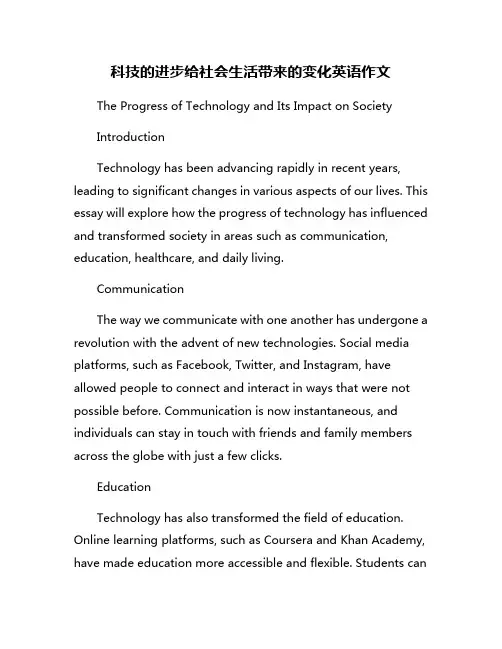
科技的进步给社会生活带来的变化英语作文The Progress of Technology and Its Impact on SocietyIntroductionTechnology has been advancing rapidly in recent years, leading to significant changes in various aspects of our lives. This essay will explore how the progress of technology has influenced and transformed society in areas such as communication, education, healthcare, and daily living.CommunicationThe way we communicate with one another has undergone a revolution with the advent of new technologies. Social media platforms, such as Facebook, Twitter, and Instagram, have allowed people to connect and interact in ways that were not possible before. Communication is now instantaneous, and individuals can stay in touch with friends and family members across the globe with just a few clicks.EducationTechnology has also transformed the field of education. Online learning platforms, such as Coursera and Khan Academy, have made education more accessible and flexible. Students cannow take courses from the comfort of their homes, at their own pace. In addition, digital tools and resources have enhanced the learning experience, making it more engaging and interactive.HealthcareThe healthcare industry has been greatly impacted by advancements in technology. Medical professionals now have access to cutting-edge tools and equipment that allow for more accurate diagnoses and treatments. Telemedicine has also made it easier for patients to consult with doctors remotely, reducing the need for in-person visits and improving access to healthcare services.Daily LivingTechnology has made our daily lives more convenient and efficient. Smart devices, such as smartphones and smart home appliances, have streamlined tasks and improved productivity. For example, individuals can now control their home's heating and lighting systems remotely using their smartphones, making it easier to manage energy usage and save money.ConclusionIn conclusion, the progress of technology has had a profound impact on society, transforming the way wecommunicate, learn, receive healthcare, and live our daily lives. While these advancements have brought about many benefits, it is important to consider the potential drawbacks and implications of technology on our society. As technology continues to evolve, it will be crucial for individuals and communities to adapt and embrace these changes in order to fully reap the benefits of a tech-driven world.。
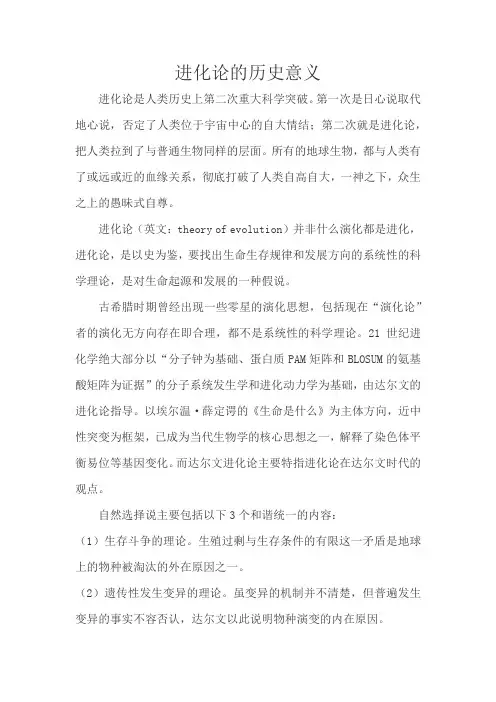
进化论的历史意义
进化论是人类历史上第二次重大科学突破。
第一次是日心说取代地心说,否定了人类位于宇宙中心的自大情结;第二次就是进化论,把人类拉到了与普通生物同样的层面。
所有的地球生物,都与人类有了或远或近的血缘关系,彻底打破了人类自高自大,一神之下,众生之上的愚昧式自尊。
进化论(英文:theory of evolution)并非什么演化都是进化,进化论,是以史为鉴,要找出生命生存规律和发展方向的系统性的科学理论,是对生命起源和发展的一种假说。
古希腊时期曾经出现一些零星的演化思想,包括现在“演化论”者的演化无方向存在即合理,都不是系统性的科学理论。
21世纪进化学绝大部分以“分子钟为基础、蛋白质PAM矩阵和BLOSUM的氨基酸矩阵为证据”的分子系统发生学和进化动力学为基础,由达尔文的进化论指导。
以埃尔温·薛定谔的《生命是什么》为主体方向,近中性突变为框架,已成为当代生物学的核心思想之一,解释了染色体平衡易位等基因变化。
而达尔文进化论主要特指进化论在达尔文时代的观点。
自然选择说主要包括以下3个和谐统一的内容:
(1)生存斗争的理论。
生殖过剩与生存条件的有限这一矛盾是地球上的物种被淘汰的外在原因之一。
(2)遗传性发生变异的理论。
虽变异的机制并不清楚,但普遍发生变异的事实不容否认,达尔文以此说明物种演变的内在原因。
(3)适者生存的理论。
生存条件一直在变化,如果物种的变异适合于变化的环境,那么就在生存斗争中取得胜利而发展;如果物种的变异不适宜于它当时生存的条件,那么就趋于衰减或灭亡。

进化论对社会科学的影响社会科学是指研究人类社会现象及其规律的学科,包括人类行为、社会组织、文化传承等方面的研究。
而进化论是生物学中的一个重要理论,描述了物种的演化和多样性发展的过程。
进化论的应用范围不仅限于生物学领域,也能对社会科学产生一定的影响。
本文将探讨进化论对社会科学的影响,并讨论其在不同领域的应用。
一、进化论对心理学的影响进化论对心理学产生了深远的影响,尤其是进化心理学的兴起。
进化心理学是一门研究人类心理特征及其演化起源的学科。
根据进化论的观点,人类心理特征的形成是对环境适应的结果,通过进化获得的适应性特征有助于人类在竞争中生存和繁衍。
进化心理学的研究方向涵盖了人类情感、社会行为以及认知过程等方面,使得心理学研究更加全面和深入。
二、进化论对社会学的影响在社会学领域,进化论为研究社会行为和社会组织提供了一种新的视角。
进化论观点认为,社会行为和社会组织也可能受到进化的影响。
社会动物如人类在漫长的进化过程中,形成了一些特定的社会行为模式,这些社会行为模式反映了适应环境的需求。
例如,人类形成了家庭制度、社群组织和合作行为等,这些形式有助于人类的群体生存和繁衍。
因此,进化论为解释社会行为提供了一个新的视角和理论框架。
三、进化论对经济学的影响进化论也对经济学领域有一定的影响。
进化经济学是近年来兴起的一个研究领域,借鉴了进化论的思想和方法,探索经济系统和市场的演化过程。
进化经济学认为,市场经济和经济行为也存在着演化的过程,经济主体的选择行为和适应性决策会对整个经济系统产生影响。
研究者利用进化论的原理解释和预测经济现象,从而拓展了经济学的研究范畴。
四、进化论对文化学的影响文化学是研究人类文化现象和文化演化的学科,进化论对文化学的研究也产生了重要影响。
进化论观点认为,文化演化也可以被视为一种遗传传递的机制,人类文化在不同群体间传递和发展,形成了文化的多样性。
利用进化论的思想和方法,文化学研究者可以更好地理解和解释文化传承、文化传播以及文化的变迁规律。
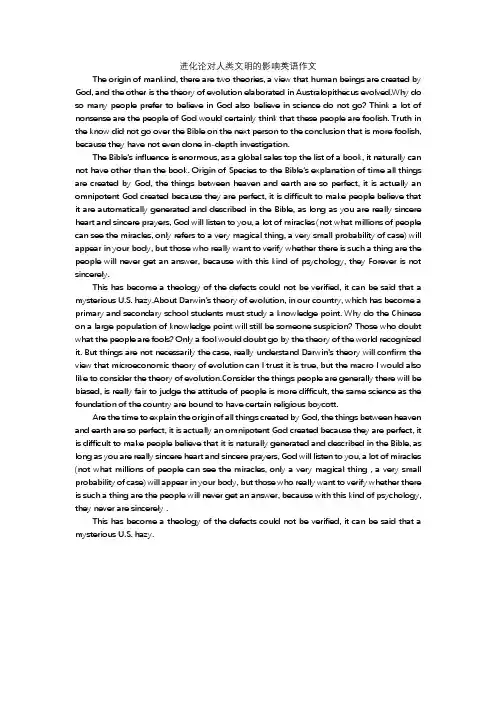
进化论对人类文明的影响英语作文The origin of mankind, there are two theories, a view that human beings are created by God, and the other is the theory of evolution elaborated in Australopithecus evolved.Why do so many people prefer to believe in God also believe in science do not go? Think a lot of nonsense are the people of God would certainly think that these people are foolish. Truth in the know did not go over the Bible on the next person to the conclusion that is more foolish, because they have not even done in-depth investigation.The Bible's influence is enormous, as a global sales top the list of a book, it naturally can not have other than the book. Origin of Species to the Bible's explanation of time all things are created by God, the things between heaven and earth are so perfect, it is actually an omnipotent God created because they are perfect, it is difficult to make people believe that it are automatically generated and described in the Bible, as long as you are really sincere heart and sincere prayers, God will listen to you, a lot of miracles (not what millions of people can see the miracles, only refers to a very magical thing, a very small probability of case) will appear in your body, but those who really want to verify whether there is such a thing are the people will never get an answer, because with this kind of psychology, they Forever is not sincerely.This has become a theology of the defects could not be verified, it can be said that a mysterious U.S. hazy.About Darwin's theory of evolution, in our country, which has become a primary and secondary school students must study a knowledge point. Why do the Chinese on a large population of knowledge point will still be someone suspicion? Those who doubt what the people are fools? Only a fool would doubt go by the theory of the world recognized it. But things are not necessarily the case, really understand Darwin's theory will confirm the view that microeconomic theory of evolution can I trust it is true, but the macro I would also like to consider the theory of evolution.Consider the things people are generally there will be biased, is really fair to judge the attitude of people is more difficult, the same science as the foundation of the country are bound to have certain religious boycott.Are the time to explain the origin of all things created by God, the things between heaven and earth are so perfect, it is actually an omnipotent God created because they are perfect, it is difficult to make people believe that it is naturally generated and described in the Bible, as long as you are really sincere heart and sincere prayers, God will listen to you, a lot of miracles (not what millions of people can see the miracles, only a very magical thing , a very small probability of case) will appear in your body, but those who really want to verify whether there is such a thing are the people will never get an answer, because with this kind of psychology, they never are sincerely .This has become a theology of the defects could not be verified, it can be said that a mysterious U.S. hazy.。

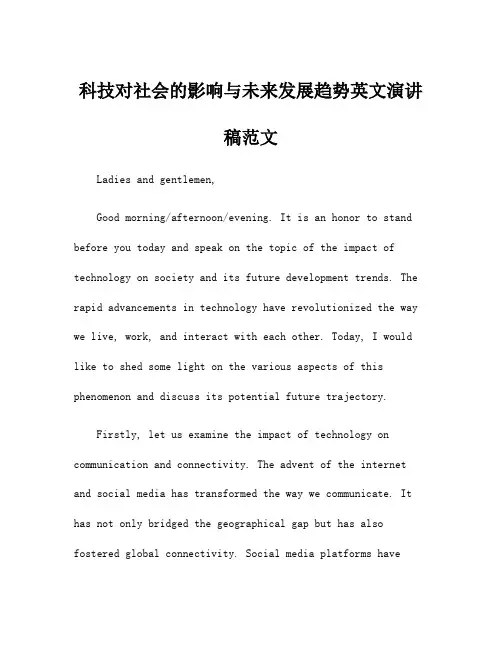
科技对社会的影响与未来发展趋势英文演讲稿范文Ladies and gentlemen,Good morning/afternoon/evening. It is an honor to stand before you today and speak on the topic of the impact of technology on society and its future development trends. The rapid advancements in technology have revolutionized the way we live, work, and interact with each other. Today, I would like to shed some light on the various aspects of this phenomenon and discuss its potential future trajectory.Firstly, let us examine the impact of technology on communication and connectivity. The advent of the internet and social media has transformed the way we communicate. It has not only bridged the geographical gap but has also fostered global connectivity. Social media platforms havegiven voice to the voiceless and have enabled the exchange of ideas and information like never before. However, with these advancements, we have also witnessed the rise of fake news and online harassment. Therefore, it is crucial that we leverage technology responsibly and ethically to combat such issues.Secondly, technology has had a significant influence on our daily lives. From the moment we wake up to the time we go to bed, technology surrounds us. Smart devices have become an integral part of our existence, simplifying various aspects of our routines. Whether it is through smart homes, wearable devices, or virtual assistants, technology has made our lives more convenient and efficient. However, we must not become completely reliant on technology, as it can lead to a sense of isolation and detachment from the real world. Striking a balance between the digital and physical realms is crucialfor maintaining our overall well-being.Furthermore, technology has transformed industries and employment opportunities. Automation and AI haverevolutionized numerous sectors, leading to increased productivity and economic growth. However, this breakthrough has also caused concern about job displacement. As we move forward, it is essential to understand that while certainroles may be automated, new roles and opportunities will arise. Adaptability and continuous learning will becomecrucial to remain relevant in the rapidly evolving job market.Looking ahead, the development trends in technology hold immense possibilities. Artificial Intelligence and Machine Learning will continue to shape our future by further enhancing automation and personalization. Internet of Things (IoT) will enable smart cities and homes, where everyday objects will be interconnected, creating a seamless experience. Virtual and augmented reality will revolutionize various industries, including education, healthcare, and entertainment.However, with great power comes great responsibility. The rapid advancement of technology raises ethical and moral questions that need to be addressed. Privacy concerns, cybersecurity threats, and the impact on mental health are significant challenges that require collective efforts tofind solutions.In conclusion, the impact of technology on society has been transformative in numerous ways. From communication to daily life to employment opportunities, technology has revolutionized our existence. As we move forward, responsible and ethical innovation will pave the way for a future where technology serves as a tool for human progress and well-being. Let us embrace and shape this future together.Thank you.。

科学进步对社会的影响英语作文The Impact of Scientific Progress on Society.Science, a dynamic and ever-evolving field, has revolutionized our world in ways that are both profound and far-reaching. Its impact on society is immense, shaping the way we live, work, and interact with each other. In this essay, we will explore the various aspects of scientific progress and its influence on society, considering both the positive and negative implications.Advancements in Healthcare.One of the most significant impacts of scientific progress is in the field of healthcare. Medical research has led to the discovery of new drugs, vaccines, and treatment methods that have saved millions of lives. For instance, the development of antibiotics has revolutionized the treatment of infectious diseases, while advancements in surgery and diagnostic tools have made procedures safer andmore effective.Moreover, genetics and biotechnology have opened new horizons in personalized medicine, allowing doctors to tailor treatments to individual patients' needs. The human genome project, for instance, has provided a roadmap for understanding and treating genetic diseases.Economic Growth and Development.Scientific progress has also been a key driver of economic growth and development. The industrial revolution, fueled by scientific discoveries such as the steam engine and electricity, transformed economies worldwide. Today, fields like information technology, biotechnology, and nanotechnology are driving innovation and creating new industries and job opportunities.The rise of the digital economy, in particular, has been transformative. The internet and associated technologies have revolutionized the way we do business, allowing for the emergence of new business models and theexpansion of markets beyond geographical boundaries.Environmental Challenges.However, the impact of scientific progress is not entirely positive. One of the most significant challenges we face today is the environmental impact of scientific and industrial activities. The widespread use of fossil fuels, for instance, has led to climate change and global warming, posing serious threats to ecosystems and human health.Scientific progress has also led to the development of weapons of mass destruction, such as nuclear and chemical weapons. These weapons pose a significant threat to global security and stability.Ethical Dilemmas.The rapid pace of scientific progress has also presented us with ethical dilemmas that we are still grappling with. One such dilemma is the use of genetic engineering to modify the traits of plants and animals.While this technology has the potential to improve crop yields and animal health, it also raises concerns about the long-term ecological impacts and the ethics of playing God.Another ethical challenge is the rise of artificial intelligence and machine learning. As machines become more intelligent and autonomous, we face questions about their role in society, their impact on employment, and their ethical implications, such as the potential for misuse and abuse.Conclusion.In conclusion, scientific progress has had a profound impact on society, shaping our world in both positive and negative ways. It has brought remarkable advancements in healthcare, economic growth, and technology, but it has also created environmental challenges and ethical dilemmas that we must address.As we continue to make scientific discoveries and develop new technologies, it is crucial that we do so witha sense of responsibility and awareness. We must strive to ensure that the benefits of scientific progress are distributed fairly and that its negative impacts are minimized. Only then can we harness the power of science to create a better, more sustainable, and more equitable world.。

英语单词博览101进化论Evolutionism当今科学界一般使用evolution表示“进化论”,evolutionism主要是在神创论与进化论的争论中被宗教界所使用,宗教界认为进化论是一种世俗的宗教。
记忆evolutionism(n.进化论)=evolution见下+ism后缀表“主义”。
evolution(n.进化)=e+volu+tion。
e-前缀“出”,volu词根“转;卷”,-tion名词后缀。
“转出来”→进化。
Evolution is not the force but a process, not a cause but a law.进化不是动力而是过程,不是原因而是法则。
词根evolutionist(n.进化论者)=evolution+ist后缀表“人”。
evolve(v.进化)=e出+volv转(=volu)+e后缀。
involve(v.卷入)=in入+volv卷+e。
revolt(v.n.反叛)=re+volt。
re-前缀“反”,volt词根“转;卷”。
“反过来转”→反叛。
revolve(v.旋转)=re反复+volv转+e。
revolution(n.革命;旋转)=re反(复)+volu转+tion名词后缀。
The heart makes a revolution, the head a reformation.感情造就革命,理智形成改革。
(后半句省略了makes。
又如培根的名句:Reading makes a full man; conference a ready man; and writing an exact man.阅读使人充实,讨论使人机敏,写作使人精确。
)revolutionary(a.革命的 n.革命者)=revolution+ary后缀。
volume(n.卷册;容量;音量)=volu卷+me后缀。
古代的书都是“卷”起来的,后来指“大本”的书,引申为“容量”、“音量”等。
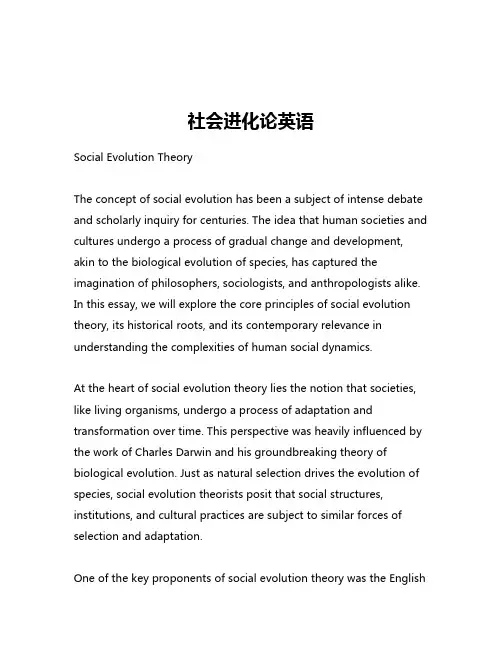
社会进化论英语Social Evolution TheoryThe concept of social evolution has been a subject of intense debate and scholarly inquiry for centuries. The idea that human societies and cultures undergo a process of gradual change and development, akin to the biological evolution of species, has captured the imagination of philosophers, sociologists, and anthropologists alike. In this essay, we will explore the core principles of social evolution theory, its historical roots, and its contemporary relevance in understanding the complexities of human social dynamics.At the heart of social evolution theory lies the notion that societies, like living organisms, undergo a process of adaptation and transformation over time. This perspective was heavily influenced by the work of Charles Darwin and his groundbreaking theory of biological evolution. Just as natural selection drives the evolution of species, social evolution theorists posit that social structures, institutions, and cultural practices are subject to similar forces of selection and adaptation.One of the key proponents of social evolution theory was the Englishphilosopher Herbert Spencer, who coined the term "survival of the fittest" to describe the process of social change. Spencer argued that societies, like biological organisms, must continuously adapt to their environment in order to thrive and survive. This adaptation, he believed, led to the gradual improvement and advancement of social structures, with more "fit" or successful societies outcompeting and ultimately replacing less adaptive ones.Another influential figure in the development of social evolution theory was the German sociologist Ferdinand Tönnies. Tönnies proposed a distinction between two types of social relationships: Gemeinschaft (community) and Gesellschaft (society). Gemeinschaft, according to Tönnies, represented traditional, organic, and intimate social bonds, while Gesellschaft referred to the more impersonal, contractual, and rational relationships that emerged with the advent of industrialization and urbanization.Tönnies saw the transition from Gemeinschaft to Gesellschaft as a fundamental aspect of social evolution, with the latter representing a more advanced and complex form of social organization. This shift, he argued, was driven by factors such as technological progress, the division of labor, and the increasing specialization of social roles.The American sociologist Talcott Parsons further developed the concept of social evolution, emphasizing the role of functionaldifferentiation and the increasing complexity of social systems. Parsons argued that as societies evolve, they become more specialized and interdependent, with various subsystems (such as the economy, politics, and culture) becoming increasingly differentiated and integrated.This process of functional differentiation, Parsons believed, was a key driver of social progress, as it allowed for more efficient and effective problem-solving and the emergence of more sophisticated forms of social organization.While social evolution theory has been influential in shaping our understanding of social change, it has also faced significant criticism and challenges. One of the primary criticisms is the perceived determinism and linearity inherent in the theory, which has been accused of oversimplifying the complex and often unpredictable nature of social change.Critics have argued that social evolution theory fails to adequately account for the role of human agency, power dynamics, and the diversity of cultural and historical contexts in shaping social transformation. They have also pointed out that the idea of a universal, linear progression of societies from "lower" to "higher" forms of organization is problematic, as it can perpetuate ethnocentric and colonial biases.Moreover, some scholars have questioned the validity of drawing direct parallels between biological and social evolution, arguing that the mechanisms and driving forces behind these two processes are fundamentally different and cannot be equated.Despite these criticisms, social evolution theory continues to hold relevance in contemporary social science and has evolved to incorporate more nuanced and critical perspectives. Modern social evolution theorists have recognized the need to account for the complexities of social change, the role of human agency, and the diversity of cultural and historical contexts.For example, some scholars have proposed the concept of "multi-linear" social evolution, which acknowledges the existence of multiple, non-linear pathways of social change, each shaped by unique historical and cultural factors. Others have emphasized the importance of understanding the interplay between structure and agency, and the ways in which social change is both shaped by and shapes the actions of individuals and groups.Furthermore, the insights of social evolution theory have been increasingly applied to the study of contemporary global challenges, such as the impacts of technological change, environmental degradation, and the dynamics of social and political conflict. Byunderstanding the processes of social evolution, scholars and policymakers can better navigate the complex and rapidly changing social landscapes of the 21st century.In conclusion, the social evolution theory has been a significant and influential framework for understanding the dynamics of social change. While it has faced criticism and undergone refinement, the core principles of the theory continue to offer valuable insights into the ways in which human societies evolve and adapt over time. As we grapple with the complexities of the modern world, the continued exploration and application of social evolution theory can provide important tools for understanding and shaping the future of our societies.。
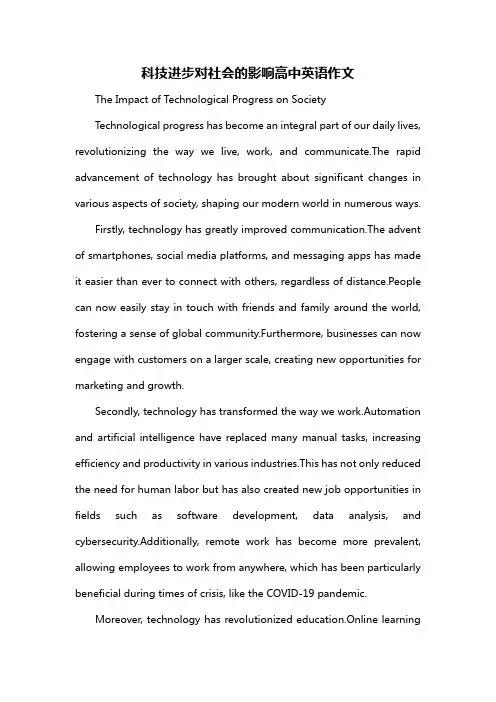
科技进步对社会的影响高中英语作文The Impact of Technological Progress on SocietyTechnological progress has become an integral part of our daily lives, revolutionizing the way we live, work, and communicate.The rapid advancement of technology has brought about significant changes in various aspects of society, shaping our modern world in numerous ways.Firstly, technology has greatly improved communication.The advent of smartphones, social media platforms, and messaging apps has made it easier than ever to connect with others, regardless of distance.People can now easily stay in touch with friends and family around the world, fostering a sense of global community.Furthermore, businesses can now engage with customers on a larger scale, creating new opportunities for marketing and growth.Secondly, technology has transformed the way we work.Automation and artificial intelligence have replaced many manual tasks, increasing efficiency and productivity in various industries.This has not only reduced the need for human labor but has also created new job opportunities in fields such as software development, data analysis, and cybersecurity.Additionally, remote work has become more prevalent, allowing employees to work from anywhere, which has been particularly beneficial during times of crisis, like the COVID-19 pandemic.Moreover, technology has revolutionized education.Online learningplatforms and virtual classrooms have made education more accessible and flexible, allowing people of all ages to acquire new skills and knowledge.This has democratized education, making it more equitable by providing equal opportunities for learning, regardless of one's location or socioeconomic background.Furthermore, technology has enabled personalized learning experiences, tailored to individual needs and learning styles, fostering a more engaging and effective educational process.However, the impact of technological progress is not without its challenges.The digital divide, for instance, has become more pronounced, as not everyone has equal access to technology and the internet.This can exacerbate existing inequalities in society, limiting opportunities for those who lack access.Moreover, the overreliance on technology can lead to a decline in face-to-face interactions, potentially affecting social skills and mental health.In conclusion, technological progress has had a profound impact on society, transforming the way we communicate, work, and learn.While it has brought about numerous benefits, it is essential to address the challenges it presents, such as the digital divide and the potential negative effects on social interactions.By doing so, we can maximize the positive impact of technology while mitigating its drawbacks, creating a more equitable and sustainable future.。

社会学名词(中英对译)中文名词英文翻译实证主义positivism /positivist动力学the dyanamics静力学the statics分工the work-division神学the theology形而上学the metaphysics进化论the evolution-theory唯名论the nominalism唯实论the realism官僚制度bureaucratic system结构主义the structuralism唯物主义the materialism辩证法Dialectic唯心主义the idealism生产关系productionrelations剩余价值Increase-value剩余劳动Overtime失调因素maladjustive factors社区community社会福利the socially-welfare社会化the socialization社会控制the social-control社会参与thesocially-participation社会工作the social work残疾人handicapped社会救助the socially-welfare问卷thequestionnaire独生子女the singles-children现代化modernization/aggiornamento基本方针the baselines行为准则Behavioral-omens矛盾contravention时代背景the time-background工业化industrialization民主化democratization文明化civilize同质性Homogeneity协调过程the coordination-process血缘的related by blood整合的integrated异质性Heterogenitaet社会阶级social layer class自然科学natural/physical science抽象科学abstract science社会秩序social order社会有机论socialorganism-theory资本主义capitalism使收入极大化make the incomemore profitable社会冲突理论social conflicttheory操作化operationalize实证分析empiricalanalysis有限理性boundedrationality经济人的利己主义倾向self-interest orientation ofeconomic actors 交互分类cross-classify维度dimension内部劳动力市场internal labor market隐性契约implicit contracts社会网络social network家族企业household enterprise固定成本fixed cost合资企业joint-stock company中产阶级bourgeois组织文化organizationalculture一般规律 a rule of thumb社会研究social research符号互动论symbolic interactionism同化assimilation行动理论Action theory表意性活动Activity expressive工具性活动Activity instrumental工作调适Adjustment work疏离Alienation同化Assimilation权威Authority科层权威Authority bureaucratic感召权威Authority charismatic双重权威Authority dual患病行为Behavior illness角色行为Behavior role偏见Bias资产阶级Bourgeoisie科层制度Bureaucracy资本家Capitalist变迁推动者/变媒Change agent传意途径Channel communication感召力Charisma文化间距Cultural lag文化震惊Cultural shock 文化Culture文化模式Culture patterns 文化特质Culture traits 主流文化Culture mainstream 达尔文Darwin非个人化Depersonalization 偏差Deviance初级偏差Deviance primary 次级偏差Deviance secondary 偏差者Deviant偏差行为Deviant behavior偏差社会地位Deviant social status 选择医生行为Doctor - shopping behaviour 涂尔干Durkheim 家庭Family平等(平权)家庭Family equalitarian 扩展式家庭Family extended 寄养家庭Family foster 母权家庭Family matriarchal 核心家庭Family nuclear 父权家庭Family patriarchal 单亲家庭Family single-parent 传统式家庭Family traditional 民间医药Folk medicine 社会动力Force social 初级收获Gain primary 次级收获Gain secondary 帮派Gang 性相Gender 代沟Generation gap 群体Group 内群体Group in 外群体Group out 朋辈群体Group peer初级(直接)群体Group primary 种族与民族群体Group race and ethnic 参照群体Group reference 次级(间接)群体Group secondary 他群体Group they- 我群体Group we- 意识型态Ideology工业化Industrialization规范(制度)化Institutionalization内化Internalization少年罪行Juvenile delinquency标签理论Labelling theory认可权力Legitimate power宏观社会学Macro-sociology马克斯Marx医疗社会学Medical sociology微观社会学Micro-sociology现代化Modernization一夫一妻制Monogamy民德Mores协商秩序Negotiated order非工作取向Non-task oriented规范Norms强制性组织Organization coercive正式组织Organization formal志愿性组织Organization voluntary典范/范例Paradigm父(男)权社会Patriarchal society柏拉图Plato现实冲击Reality shock再社会化Resocialization角色Role角色冲突Role conflict角色集合Role set倚赖性的病人角色Role dependant - patient 自我实现预言Self - fulfilling prophecy 病者角色Sick role社会变迁Social change社会阶层(级)Social classes社会管制Social control会制度Social institutions社会互动Social interaction社会流动Social mobility社会规范Social norm社会秩序Social order社会组织Social organization社会污名(烙印)Social stigma社会阶层Social stratum社会结构Social structure社会支援网络Social support network社会(教)化Socialization社会(教)化过程Socialization process 社会化的机构(媒介)Socialization agents of 初级社会化Socialization primary 次级社会化Socialization secondary地位Status自致(成就)地位Status achieved先赋地位Status ascribed定型效应Stereotyping effect污名/烙印Stigma污名化/烙印化Stigmatization次文化Subculture演译系统System of interpretation禁忌Taboo价值体系Value system西化Westernization第一部分Part OneI-欧洲古典社会学家Auguste Comte奥古斯特•孔德Karl Marx 卡尔•马克思Herbert Spencer 赫伯特•斯宾塞Vilfredo Pareto 维尔弗雷多•帕累托Ferdinand Toennies费迪南德•滕尼斯Emile Durkheim 埃米尔•涂尔干Georg Simmel 格奥尔格•齐美尔Gaetano Mosca 加耶塔诺•莫斯卡Max Weber 马克斯•韦伯Leonard T. Hobhouse 莱奥纳多。
关于进化论的英语作文Essay on Evolutionary TheoryEvolutionary theory, proposed by Charles Darwin, is a fundamental concept in biology that explains the diversity of life on Earth. The theory postulates that all species are related through a process of gradual change over time. This essay will discuss the key principles of evolutionary theory, the evidence supporting it, and its profound impact on our understanding of the natural world.The first principle of evolutionary theory is natural selection. According to Darwin, individuals within a population exhibit variation in traits. Some of these variations provide individuals with a better chance of survival and reproduction in a given environment. Those individuals who possess advantageous traits are more likely to pass them on to their offspring, leading to an increase in the frequency of these traits within the population over generations. This process of natural selection results in the adaptation of species to their specific environments.Genetic variation is another crucial component of evolutionary theory. Within a population, genetic diversity arises from mutations, genetic recombination, and genetic drift. These variations serve as the raw material for natural selection to act upon. Beneficial variations allow individuals to better adapt to their environment and increase their chances of survival, while harmful variations are less likely to be passed on.Evolutionary theory is supported by a vast array of evidence from various scientific disciplines. The fossil record provides a record of past life forms, showing the progression and diversification of species over time. Fossil evidence reveals transitional forms, linking different species and supporting the notion of common ancestry.Comparative anatomy is another line of evidence for evolution. It demonstrates both similarities and differences in the structure of organisms. Homologous structures, such as the forelimbs of vertebrates, share a common structure despite their different functions. This suggests a shared ancestor. In contrast, analogous structures, such as the wings of birds and insects, havesimilar functions but different evolutionary origins, indicating convergent evolution.Molecular biology has contributed significant evidence to evolutionary theory. DNA sequencing and analysis demonstrate the similarities and differences in the genetic codes of different species. The presence of highly conserved genes among diverse species supports the idea of a common ancestry. Additionally, the comparison of gene sequences allows scientists to construct evolutionary trees that show the relationships between different organisms.The implications of evolutionary theory extend beyond the field of biology. It has provided a framework for understanding the development and diversification of life on Earth. Evolutionary concepts have applications in agriculture, medicine, and conservation. Understanding the mechanisms of evolution allows us to tackle issues such as antibiotic resistance, the impact of environmental changes on biodiversity, and the breeding of crops with desirable traits.In conclusion, evolutionary theory is a foundational concept in biology that explains the diversity of life onEarth. The principles of natural selection and genetic variation provide a mechanism for the adaptation and change of species over time. The evidence from the fossil record, comparative anatomy, and molecular biology supports the notion of common descent and the relationships between organisms. Evolutionary theory has revolutionized our understanding of the natural world and has diverse practical applications.。
社会学名词(中英对译)社会学名词(中英对译)中⽂名词英⽂翻译实证主义positivism /positivist动⼒学 the dyanamics静⼒学 the statics分⼯ the work-division神学 the theology形⽽上学 the metaphysics进化论the evolution-theory唯名论 the nominalism唯实论 the realism官僚制度bureaucratic system结构主义 the structuralism唯物主义the materialism辩证法Dialectic唯⼼主义 the idealism⽣产关系 productionrelations剩余价值 Increase-value剩余劳动Overtime失调因素maladjustive factors社区 community社会福利the socially-welfare社会化 the socialization社会控制the social-control社会参与 thesocially-participation社会⼯作 the social work残疾⼈handicapped社会救助the socially-welfare问卷 thequestionnaire独⽣⼦⼥the singles-children现代化modernization/aggiornamento基本⽅针the baselines⾏为准则Behavioral-omens⽭盾contravention时代背景the time-background⼯业化 industrialization民主化 democratization⽂明化civilize同质性Homogeneity协调过程 the coordination-process⾎缘的related by blood整合的 integrated异质性Heterogenitaet社会阶级 social layer class⾃然科学 natural/physical science抽象科学 abstract science社会秩序 social order社会有机论 socialorganism-theory资本主义 capitalism使收⼊极⼤化 make the incomemore profitable社会冲突理论 social conflicttheory操作化 operationalize实证分析 empiricalanalysis有限理性 boundedrationality经济⼈的利⼰主义倾向 self-interest orientation ofeconomic actors 交互分类 cross-classify 维度dimension内部劳动⼒市场internal labor market隐性契约 implicit contracts社会⽹络 social network家族企业 household enterprise固定成本 fixed cost合资企业 joint-stock company中产阶级 bourgeois组织⽂化 organizationalculture⼀般规律 a rule of thumb社会研究social research符号互动论symbolic interactionism同化assimilation⾏动理论Action theory表意性活动Activity expressive⼯具性活动Activity instrumental⼯作调适Adjustment work疏离Alienation同化Assimilation权威Authority科层权威Authority bureaucratic感召权威Authority charismatic双重权威Authority dual患病⾏为Behavior illness⾓⾊⾏为Behavior role偏见Bias资产阶级Bourgeoisie科层制度Bureaucracy资本家Capitalist变迁推动者/ 变媒Change agent传意途径Channel communication感召⼒Charisma⽂化间距Cultural lag⽂化震惊Cultural shock⽂化Culture⽂化模式Culture patterns⽂化特质Culture traits主流⽂化Culture mainstream达尔⽂Darwin⾮个⼈化Depersonalization偏差Deviance初级偏差Deviance primary次级偏差Deviance secondary偏差者Deviant偏差⾏为Deviant behavior偏差社会地位Deviant social status选择医⽣⾏为Doctor - shopping behaviour 涂尔⼲Durkheim 家庭Family平等(平权)家庭Family equalitarian扩展式家庭Family extended寄养家庭Family foster母权家庭Family matriarchal核⼼家庭Family nuclear⽗权家庭Family patriarchal单亲家庭Family single-parent传统式家庭Family traditional民间医药Folk medicine社会动⼒Force social初级收获Gain primary次级收获Gain secondary帮派Gang性相Gender代沟Generation gap群体Group内群体Group in外群体Group out朋辈群体Group peer初级(直接)群体Group primary种族与民族群体Group race and ethnic 参照群体Group reference次级(间接)群体Group secondary他群体Group they-我群体Group we-意识型态Ideology⼯业化Industrialization规范(制度)化Institutionalization内化Internalization少年罪⾏Juvenile delinquency标签理论Labelling theory认可权⼒Legitimate power宏观社会学Macro-sociology马克斯Marx医疗社会学Medical sociology微观社会学Micro-sociology现代化Modernization⼀夫⼀妻制Monogamy民德Mores协商秩序Negotiated order⾮⼯作取向Non-task oriented规范Norms强制性组织Organization coercive正式组织Organization formal志愿性组织Organization voluntary典范/ 范例Paradigm⽗(男)权社会Patriarchal society柏拉图Plato现实冲击Reality shock再社会化Resocialization⾓⾊Role⾓⾊冲突Role conflict⾓⾊集合Role set倚赖性的病⼈⾓⾊Role dependant - patient ⾃我实现预⾔Self - fulfilling prophecy 病者⾓⾊Sick role社会变迁Social change社会阶层(级)Social classes社会管制Social control会制度Social institutions社会互动Social interaction社会流动Social mobility社会规范Social norm社会秩序Social order社会组织Social organization社会污名(烙印)Social stigma社会阶层Social stratum社会结构Social structure社会⽀援⽹络Social support network社会(教)化Socialization社会(教)化过程Socialization process社会化的机构(媒介)Socialization agents of 初级社会化Socialization primary次级社会化Socialization secondary地位Status⾃致(成就)地位Status achieved先赋地位Status ascribed定型效应Stereotyping effect污名/ 烙印Stigma污名化/ 烙印化Stigmatization次⽂化Subculture演译系统System of interpretation禁忌Taboo价值体系Value system西化Westernization第⼀部分Part OneI-欧洲古典社会学家Auguste Comte 奥古斯特?孔德Karl Marx 卡尔?马克思Herbert Spencer 赫伯特?斯宾塞Vilfredo Pareto 维尔弗雷多?帕累托Ferdinand Toennies 费迪南德?滕尼斯Emile Durkheim 埃⽶尔?涂尔⼲Georg Simmel 格奥尔格?齐美尔Gaetano Mosca 加耶塔诺?莫斯卡Max Weber 马克斯?韦伯Leonard T. Hobhouse 莱奥纳多。
科技进步对社会的影响英语作文The Impact of Technological Progress on SocietyIntroductionTechnological progress has been a driving force in shaping the way society functions. It has revolutionized industries, transformed communication, and changed the way we live our daily lives. In this essay, we will explore how technology has impacted various aspects of society and discuss both the positive and negative effects it has had on individuals and communities.Impact on CommunicationOne of the most significant impacts of technological progress on society is the transformation of communication. The invention of the telephone, followed by the internet and mobile phones, has made it easier for people to connect with each other across the globe. Social media platforms have also allowed individuals to share information and ideas in real-time, creating virtual communities and enabling collaboration on a global scale.However, while technology has made communication more convenient, it has also led to the rise of fake news and misinformation. The spread of misinformation online has the potential to manipulate public opinion and underminedemocracy. It is essential for individuals to be critical consumers of information and verify the credibility of sources before sharing or believing in them.Impact on EconomyTechnological progress has also had a significant impact on the economy. Automation and artificial intelligence are revolutionizing industries, leading to increased productivity and efficiency. However, they also pose a threat to traditional jobs, as robots and machines can perform tasks more quickly and accurately than humans. This has led to concerns about job displacement and income inequality.On the other hand, technological advancements have also created new opportunities for entrepreneurship and innovation. Digital platforms have made it easier for small businesses to reach a global audience and compete with larger corporations. The gig economy has also provided new ways for individuals to earn income through freelance work and online marketplaces.Impact on EducationThe integration of technology into education has transformed the way students learn and teachers teach. Online courses and educational apps have made learning moreaccessible and personalized, allowing students to progress at their own pace and access resources from anywhere in the world. Virtual reality and augmented reality technologies have also enhanced the learning experience by creating immersive and interactive environments.However, the digital divide remains a significant challenge in education, as not all students have access to technology and the internet. This has widened the gap between privileged and marginalized communities, leading to disparities in educational outcomes. It is crucial for policymakers to address these issues and ensure that all students have equal opportunities to access quality education.Impact on HealthTechnology has also had a profound impact on healthcare, transforming the way medical professionals diagnose and treat patients. Telemedicine and remote monitoring technologies have made it easier for patients to consult with doctors and receive care without having to visit a healthcare facility. Wearable devices and health apps have also empowered individuals to take control of their health and wellness by tracking their fitness goals and monitoring chronic conditions.However, the increasing reliance on technology in healthcare has raised concerns about data privacy and security. The collection and sharing of sensitive medical information can put individuals at risk of identity theft and medical fraud. It is essential for healthcare organizations to implement robust cybersecurity measures to protect patient data and ensure the trust and confidence of their patients.ConclusionIn conclusion, technological progress has had a profound impact on society, transforming the way we communicate, work, learn, and stay healthy. While it has brought about numerous benefits and opportunities, it has also raised challenges and concerns that need to be addressed. It is essential for individuals, businesses, and governments to adapt to the rapid pace of technological change and ensure that its benefits are harnessed for the greater good of society. Only by working together can we create a future where technology enhances our lives and creates a more prosperous and equitable world.。
达尔文进化论英文作文英文:Darwin's theory of evolution is one of the most important scientific theories in history. It proposes that all species of life have descended from a common ancestor through a process of natural selection. This means that the organisms that are best adapted to their environment are more likely to survive and reproduce, passing on their advantageous traits to their offspring. Over time, these advantageous traits accumulate and can lead to the development of new species.One of the key examples of natural selection in action is the peppered moth. Before the Industrial Revolution, most peppered moths had light-colored wings, which helped them blend in with the light-colored trees they lived on. However, as pollution from factories darkened the trees, the darker-colored moths became more difficult for predators to spot and began to thrive. This led to a shiftin the moth population, with the darker moths becoming more common.Another example is the evolution of the giraffe's long neck. It was once thought that giraffes evolved long necksin order to reach leaves on tall trees. However, recent research suggests that the long necks actually evolved as a result of sexual selection. Male giraffes with longer necks are better able to compete for mates, and their offspring inherit their longer necks.Overall, Darwin's theory of evolution has had aprofound impact on our understanding of the natural world.It has helped us to explain the diversity of life on Earth and has provided a framework for studying how species change over time.中文:达尔文的进化论是历史上最重要的科学理论之一。